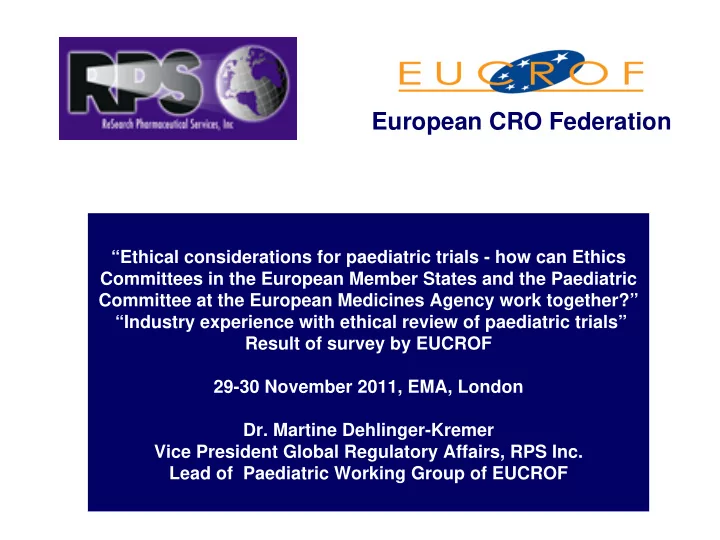

European CRO Federation “Ethical considerations for paediatric trials - how can Ethics Committees in the European Member States and the Paediatric Committee at the European Medicines Agency work together?” “Industry experience with ethical review of paediatric trials” Result of survey by EUCROF 29-30 November 2011, EMA, London Dr. Martine Dehlinger-Kremer Vice President Global Regulatory Affairs, RPS Inc. Lead of Paediatric Working Group of EUCROF
Agenda Introduction and Background Information Experience with Ethical Review of Paediatric Trials; EUCROF Survey Survey results Individual Cases Studies Conclusion
Number of Paediatric Studies in EEA Number of paediatric studies have increased from 2005 to 2010 >600 studies in 2005 to 949 studies in 2010 1200 1000 800 600 400 200 0 2005 2006 2007 2008 2009 2010 Source: Paolo Tomasi, Head of Paediatric Medicines, European Medicines Agency, March 2011
EUCROF SURVEY
“ Industry experience with ethical review of paediatric trials” – EUCROF Survey Results Data collected Collected between September - October 2011 Were consulted • All European countries through EUCROF (11 CRO Associations, approx. 300 CROs) • 3 Peadiatric Networks (France and Germany) Data received 15 Responses: Case Studies, from CROs only
“ Industry experience with ethical review of paediatric trials” – EUCROF Survey Results Countries involved in the studies Austria, Belgium, Bulgaria, Denmark, Finland, Germany, Italy, Netherlands, Norway, Poland, Spain, Sweden & UK Studies overview Studies performed between 2008 and 2011: 2008 (1), 2009 (5), 2010 (5), 2011 (4) 14 multinational studies, 1 national study 1 phase I, 5 phase II, 9 phase III
Case studies - Concerns from Ethic Committees
Concerns from Ethic Committees Child protection Request change to ICF & provide assent per age group (8/15) Burden for participants, impact schooling (1/15) Exclusion of mentally disabled minors (1/15) Contraception (2/15) Study procedure Blood volume collection, Number of Vena punctures (3/15) Invasive procedures (2/15)
Concerns from Ethic Committees Study design Benefit of study to paediatric subject (2/15) Product already approved in adolescent (1/15) Clarifications on the sample size calculation (1/15) Inclusion new groups in extension study (1/15) Evaluation strategy, subgroup analysis (1/15) Use of placebo questioned (1/15) Others Qualification of investigator & paediatric experience (1/15) Insurance coverage (1/15) EC with no concern 1/15
Outcome from the EC reviews
INDIVIDUAL CASE STUDIES
A Multicenter, Double-blind, Randomized, Placebo-controlled, 4-Armed Parallel Group Study to Evaluate the Efficacy of XX 0.5-, 2.5- and 5-mg Nasal Spray in the Treatment of Acute Migraine Headache in Adolescents - QUESTION
A Multicenter, Double-blind, Randomized, Placebo-controlled, 4-Armed Parallel Group Study to Evaluate the Efficacy of XX 0.5-, 2.5- and 5-mg Nasal Spray in the Treatment of Acute Migraine Headache in Adolescents - RESOLUTION
A Multicenter, Double-blind, Randomized, Placebo-controlled, 4-Armed Parallel Group Study to Evaluate the Efficacy of XX 0.5-, 2.5- and 5-mg Nasal Spray in the Treatment of Acute Migraine Headache in Adolescents
A Multicenter, Double-blind, Randomized, Placebo-controlled, 4-Armed Parallel Group Study to Evaluate the Efficacy of XX 0.5-, 2.5- and 5-mg Nasal Spray in the Treatment of Acute Migraine Headache in Adolescents - RESOLUTION
A Multicenter, Double-Blind, Parallel-group Study to Evaluate Short-Term Safety and Efficacy and Long-Term Maintenance of Two Dose Levels of Rabeprazole Sodium Delayed-Release Pediatric Bead Formulation in 1-to-11-Year-Old Paediatric Subjects With Endoscopically Proven GERD
Short-Term Safety and Efficacy and Long-Term Maintenance of Two Dose Levels of Rabeprazole Sodium Delayed-Release Pediatric Bead Formulation in 1-to-11-Year-Old Pediatric Subjects With Endoscopically Proven GERD. RESOLUTION
Allergy – Allergic Rhinitis & Chronic Urticaria
Allergy – Allergic Rhinitis & Chronic Urticaria
Conclusion
No cases from Paediatric Networks Conclusion
Acknowledgments EUCROF, EU CRO Federation, Roma, Italy EUCROF Paediatric Working Group Amparo Alemany Pozuelo, TFS, Madrid, Spain
Dr. Martine Dehlinger-Kremer Vice President, Global Regulatory Affairs, RPS Inc. Lead Paediatric Working Group EUCROF Eucrof email: martine.dehlinger@eucrof.eu Web: www.eucrof.eu RPS email: mdehlingerkremer@rpsweb.com Web: http://www.rpsweb.com
Let us perform high quality Paediatric Studies and improve Health for Children THANK YOU FOR YOUR ATTENTION!
Recommend
More recommend